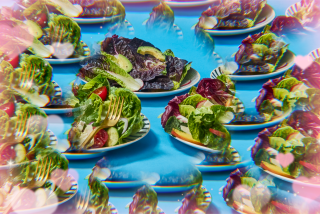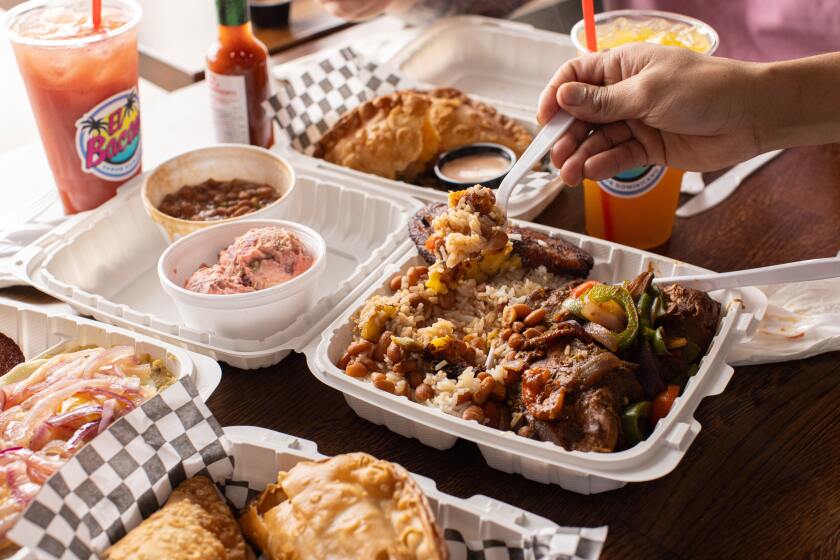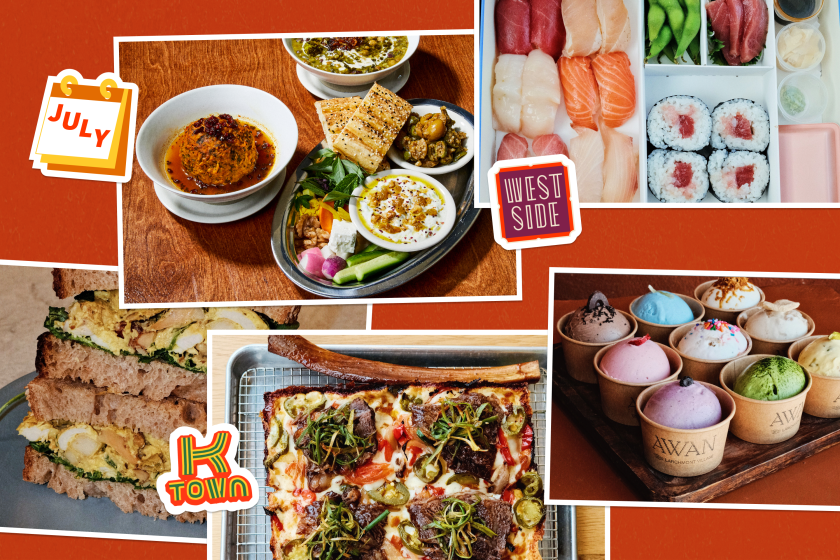Taking a Fresh Look at Fruitcake : Merchandising: You get ‘em, you hate ‘em. But fruitcakes don’t deserve the bad rap, a bakers group contends.
“Fruitcake, misunderstood and stripped of its former stature by greed and corporate merchandising, needs our help!”
From “In Defense of Fruitcake”
Call it the Fruitcake Revolution.
Like all good struggles out of oppression, it started small. To be honest, it’s still in its infancy. But that doesn’t mean it isn’t struck with the same kind of passion that has powered righteous battles throughout history.
Its father is Richard Seaberg, author of the 1987 tract, “In Defense of Fruitcake.” Its birthplace: Favourites Bakery, Portland, Ore. Its symbol: the big sign hanging in Favourites that proclaims, “No fruitcake jokes.”
After two decades of fruitcake bashing in venues from the New York Times to Johnny Carson’s monologues on the “Tonight Show,” baking industry experts contend that fruitcake eating is on the upswing. And a group called the Retail Bakers of America is doing all that it can to bring dignity back to the ranks of fruits and nuts.
An improving economy and increased interest in good food have helped the tainted torte, say officials of the trade group. After the recession of the early 1980s, which battered fruitcake bakers nationwide, consumers are again willing to pay the price for quality cake--between $4 and $10 per pound, right up there with filet mignon.
Fruitcake is showing up in trendy Los Angeles eateries for as much as $6.50 a slice in its Italian incarnation, pan forte . Neighborhood bakeries throughout the nation claim that they’ll run out of the standard version a week before Christmas even arrives. Their warning: Buy now and avoid disappointment.
“I think the pendulum is swinging in our direction,” Seaberg said. “Many of us food people out here in our 30s and early 40s, we enjoy the good life. We like to go out to dinner and eat interesting things. There’s definitely a trend back toward fruitcake--no question about it. And it’s about time.”
But there’s still a long way to go before this centuries-old sweet regains the respect that baked-goods boosters say it deserves.
Consider: Last Christmas season, baker Robert Hiller of Janesville, Wis., went on the radio waves in New York City to help bolster the reputation of the much maligned confection. One caller, telephoning from a bar, took umbrage that perfectly good brandy was being wasted in perfectly wretched fruitcake.
“He said, ‘I’m just lucky I’m sitting here at a bar,’ ” recounted Hiller, who is a past president of the bakers association. “ ‘I want a shot of pure brandy.’ And boom! He hung up on me.”
The catalyst for Hiller’s presence on the drive-time, phone-in talk show was a small survey released last winter by American Express, a look at American gift-giving preferences that lighted a fire under the bakers. To any baker worth his salt, the results could not be ignored.
Fruitcake was cited as the worst possible gift by 31% of those surveyed; 18% said that no gift was the worst possible present. In other words, nearly twice as many people would rather receive an empty box than one filled with fruitcake.
Incensed, the bakers association mobilized and got Hiller on the air.
“The announcer said all he remembered fruitcake was good for was a doorstop,” Hiller recalled. “He said he got one for a present one year and used it on his patio. It was the best doorstop he’d had in his life.”
This holiday season, MasterCard International came out with a gift-giving study, and the results were even more dismal: 75% of those surveyed said that a fruitcake was the gift that they least wanted to receive.
But Hiller is a philosophical man who has been baking fruitcake for a full 40 years. At the pace his cakes have been selling, he’ll run out a week before Christmas. Such customer response helps him be thick-crusted about all this abuse.
He’s proud of his product, he said, and he eats it himself. His customers are loyal and not a bit the worse for wear after ingesting his holiday mix of cherries, pineapple, rum-soaked raisins, pecans, sugar, butter, eggs and a bit of flour. But it’s tough sometimes.
“It does bother me,” Hiller said of his lot. “But we never worry, dear. We never sell less than 1,400 to 1,600 pounds. And we probably sell more fruitcake now than ever.” Hiller says his new marketing strategy has helped: Let the people see what’s in it, and they’ll buy it every time. So the baker got a secondhand beer sign, the kind that lights up when you plug it in, with glass on two sides and a neon trademark inside. He gutted the contraption and filled it with pieces of thinly sliced fruitcake.
“Then you turn the light on,” he said. “The light shows all the nuts, pineapples and cherries. It looks like a church window. It’s beautiful.”
Not all bakers must go to such lengths to sell their wares. At Campanile, a trendy restaurant and bakery that opened six months ago in Los Angeles, well-heeled diners think nothing of shelling out $6.50 for a very thin slice of Nancy Silverton’s pan forte.
Silverton eschews the traditional candied fruits that curse the country’s cheapest fruitcakes and sticks to ingredients such as sour dried cherries, organic black mission figs, organic dried pears and apricots, brandied poached prunes, hazelnuts and almonds.
“I have never been a fruitcake fan myself,” Silverton said. “Mainly because of the fruit used in them. Pan forte is a dessert that I like very much, though. Now that is a fruitcake. We are selling more of it all the time.”
William McNutt, however, is a fruitcake fan. He’s also owner of the 94-year-old Collin Street Bakery in Corsicana, Tex., arguably the most successful fruitcake manufacturer in the country. Except for one year in the recession-ridden early 1980s, annual sales at Collin Street Bakery have always surpassed those of the previous year, McNutt said.
Regardless of his success--this year he’ll sell 4 million pounds--McNutt still has to contend with fruitcake’s generic bad reputation.
“Seventy-five percent of the fruitcake produced in this country is pure unadulterated junk,” McNutt said. “It’s baked to sell at cheap prices to take advantage of a traditional selling season. We find in our business that we have something to first live down before we can begin to live up to something else.”
Fruitcake dates from Egyptian times, when cooks gathered an array of tropical fruits--some of which were preserved by drying in the sun--and made a form of the food by mixing them with honey and the ground meal of a cereal such as wheat. Aromatic spices were added to taste.
Early English sailors traveling in tropical climates took later versions of the cake back to their home ports to trade for vast sums. Another culinary myth suggests that fruitcake started out as a Christmas soup that was gradually thickened with fruit and spice until it became nearly solid.
It’s entirely solid now and prized enough that it’s served as a traditional wedding cake in the British Isles. And it was still popular in this country at least until the Depression, when citron made its insidious way into simpler recipes.
Citron is a thick-skinned, yellow fruit resembling a lime or lemon. Fruitcake purists point their wooden spoons at citron for the blame when discussing the confection’s loss of popularity. “It has a bitter taste, and if it gets a little old, it gets a rancid soapy taste,” said Robert Galloway, head of the baking production and management technology program at Dunwoody Institute in Minneapolis. “I think in the Depression time it was cheap, easy to get a hold of. . . . Anything that contains citron in the fruitcake line is considered to be of a lesser quality.”
Then came those metal tins, the ones embossed with faux Currier and Ives scenes and filled with what Seaberg said in “The Defense of Fruitcake” is “the perfectly merchandised two pounds . . . of batter-laced citron, ready to go for $2.99.”
That’s the cake that makes the rounds from one house to another, he insisted; the one that’s never opened, just given away over and over again. It’s also the kind of cake that no self-respecting baker would sell, he said. But it’s available in the drugstore, at the corner filling station or the local hardware store.
“All they’re selling is the can,” lamented Hiller. “As far as the cake inside, ew, man! My brother owns a True Value hardware store in the north of Wisconsin. He had all this fruitcake piled up. I say, ‘Don, how can you sell it for $2.49.’ He says, ‘I don’t know. I never ate the junk.’ ”
More to Read
Eat your way across L.A.
Get our weekly Tasting Notes newsletter for reviews, news and more.
You may occasionally receive promotional content from the Los Angeles Times.







